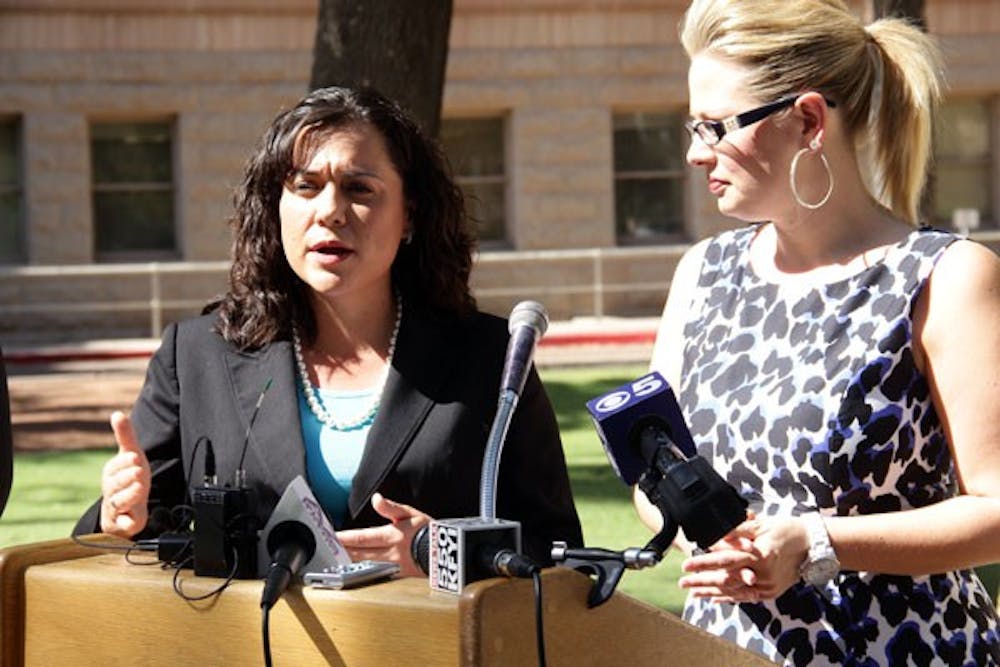The Supreme Court upheld the central tenet of President Barack Obama's Patient Protection and Affordable Care Act on Thursday morning with a 5-4 vote, citing its constitutionality under Congress' right to impose taxes.
Obama signed the PPACA into law in March 2010. The federal statute requires individuals who can afford health insurance, but are not covered by an employer or government-based health insurance plan, to purchase insurance or pay a tax as substitute. The statute further expands Medicaid to families who cannot afford health insurance and increases insurance coverage to individuals with preexisting conditions.
Arizona was one of 26 states to challenge the federal government on the Medicaid portion of the law, which attempted to require states expand Medicaid coverage in exchange for continued federal funding. The court ruled that the loss of Medicaid funding, up to 10 percent of some states' budgets, was so large as to coerce states into participating, said W.P. Carey School of Business Professor Marjorie Baldwin.
The ruling made it clear the federal government can tell states to expand Medicaid coverage, but cannot take away funding for the program if they opt out, she said.
"States have a choice that they didn't have before," Baldwin said.
This election-year SCOTUS ruling has been key in the presidential election. In the two years since the law was signed, Republicans have used it as evidence that government is too large. The argument worked for Republicans like Rep. David Schweikert, R-Tempe, who beat former Rep. Harry Mitchell in 2010. Schweikert posted campaign sign toppers near Harry Mitchell signs in Tempe that year with messages like "Supports Obamacare" and "Hides from voters."
Despite its declared constitutionality, many universal healthcare advocates continue to indicate that the PPACA doesn't do enough to universalize healthcare and have called for movement toward a single-payer healthcare system. A single-payer system would eliminate the privatized insurance industry, putting health insurance in a single government-regulated pool.
Margaret Flowers, a congressional fellow of Physicians for a National Health Program, said in a Radio Phoenix interview that the PPACA was more about politicking than creating a working healthcare policy.
"(Physicians for a National Health Program) does not think it's right to force people to purchase a private product," Flowers said. "We don't want to further privatize our healthcare. It's not constitutional."
She said the statute does help more people and expands Medicaid, but doesn't reach the goal of providing health coverage for all Americans.
"It's got to be about what's best for American people," Flowers said.
Many state legislatures, including Arizona's, sought to combat the PPACA following it being signed into law by the president.
The Arizona Health Insurance Reform Amendment, a legislatively-referred amendment to the state constitution, was passed on the November 2010 ballot. The amendment bars any federal regulations that would require state residents or employers to participate in a national healthcare system, but also maintains individuals' rights to purchase private health insurance.
U.S. Rep. David Schweikert, R-Tempe, said in a news release the PPACA remains the most "economically devastating" government mandate America has seen and, like other state Republicans, vowed to pursue a full repeal of the law.
“If the Supreme Court will not repeal this job-killing, tax-hiking mandate, then I will fight until every ounce of ObamaCare is repealed and replaced," Schweikert said.
Several Democrats in the Arizona House of Representatives held a sparsely attended news conference at the Capitol's Rose Garden Thursday morning and agreed that the Supreme Court's decision was the first step in creating a more effective national healthcare system.
Rep. Anna Tovar, D-Tolleson, said the law allows Americans to decide if they want to purchase healthcare, or opt out and pay the fine.
"Republicans can go into the semantics of if this is a tax or not, but ultimately this is an opportunity for all Americans to have affordable health care," Tovar said.
Tovar is a cancer survivor and transplant recipient, and said in a statement that the ruling impacted her at a personal level.
"I understand deeply how crucial it is for people to have access to quality health care," Tovar said in a statement. "All Arizonans should expect coverage that will provide life-saving treatment when they need it."
Tovar said the statute will protect individuals from unfair health insurance practices and will keep insurance premiums low.
"The Affordable Care Act is a major step toward meaningful reform," she said.
Rep. Chad Campbell, D-Phoenix, said in a news release that there is no question that the nation's current healthcare system is broken.
"(Healthcare) is too expensive and the insurance companies are calling the shots," Campbell said. "We need reform and we need it now."
Reach the reporter at dgrobmei@asu.edu
Shawn Raymundo and Yvonne Gonzalez contributed to this story.
Follow us on Twitter or like us on Facebook.





